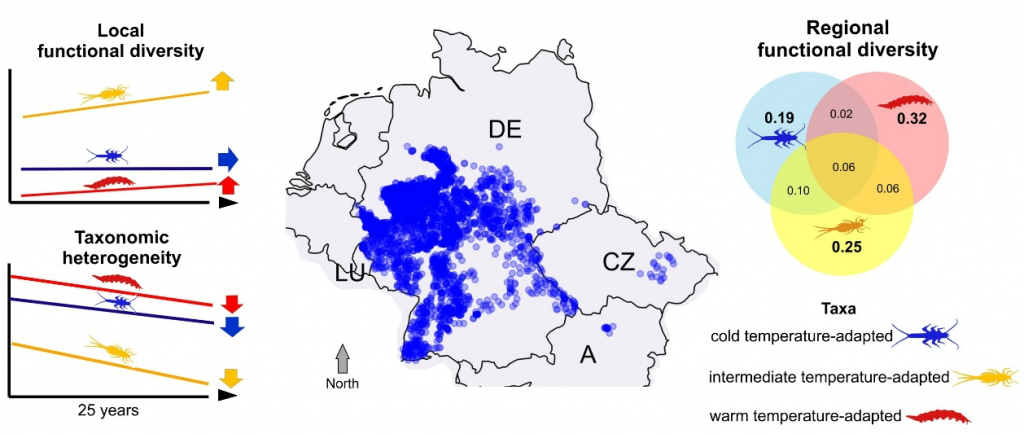In this blogpost, Dr. Alessandro Manfrin, postdoc of the DFG RTG SystemLink, talks about his recent study published “Taxonomic and functional reorganization in Central European stream macroinvertebrate communities over 25 years”. Here they observed that because of increasing temperatures, species that favour cold waters are progressively replaced by those that favour warm temperatures leading to functional alterations of the community.
A decline in insect population
Many insect groups are declining worldwide at an unprecedented pace due to several causes such as pesticides, drastic changes of the landscape and climate warming. Particularly in rivers, because of the increased temperature of the river water, we are assisting to a general “thermophilization” with a replacement of species that favour cold temperatures by species that favour warm temperatures.
Freshwater habitats are among the most threatened ecosystems on earth and are severely affected by climate warming. Many insects have life cycles that include aquatic eggs and immature larvae or nymphs, and terrestrial adults. During the aquatic phase, they are part of a larger group called „macroinvertebrates“, which also includes snails, worms, crayfish, and clams. Macroinvertebrates play a key role in river and lake ecosystems since they are important food sources for predators like fish and amphibians and contribute to nutrient recycling. Furthermore, when these insects emerge from the water, they play an important ecological role in terrestrial ecosystems, serving as an essential source of energy for many terrestrial consumers such as spiders, birds and bats and also as important pollinators.
Link between high temperature and macroinvertebrate functional diversity
In this study, Dr Manfrin and colleagues, related the ongoing thermophilization of European rivers with changes in macroinvertebrate behavioural, anatomical and physiological characteristics (defined as functional traits). Increased water temperature can, in fact, favour macroinvertebrates with traits to cope with such changing conditions. Increasing temperature can favour a certain type of animals that move in a certain way, live in a certain habitat (e.g., sandy or rocky substrates instead of vegetation) or that prey on a specific food. The overall set of traits has been used to calculate a measure of functional diversity of the community.
With some surprise, the authors observed that across the study period (from 1990 to 2014), there was an increase in the functional diversity. While such a result could be considered synonymous of improved ecological conditions for macroinvertebrate communities inhabiting European rivers, a better look indicated that the increased functional diversity was primarily driven by the rising occurrence of generalist thermophilic taxa, while taxa that favoured colder habitats were being negatively affected by increased temperature (see paper from Haase et al.,2019).

Results
This study suggests that the wide expansion of generalist thermophilic taxa, colonising also higher altitude sites, led to a progressive community homogenisation at the regional scale. This means that rivers in Europe are getting more and more similar in terms of macroinvertebrate communities living in them.
Conclusion
The reported increase in local functional diversity can primarily be attributed to the colonization by thermophilic macroinvertebrates. However, these patterns could mask the subtle loss of sensitive species that live in colder water temperature, which possess irreplaceable functional traits, and therefore, risk becoming functionally extinct.
The paper was titled ‘Taxonomic and functional reorganization in Central European stream macroinvertebrate communities over 25 years’ was authored by Dr. Alessandro Manfrin, Francesca Pilotto, Stefano Larsen, Jonathan D. Tonkin, Armin W. Lorenz, Peter Haase and Stefan Stoll and published in Science of the Total Environment.
